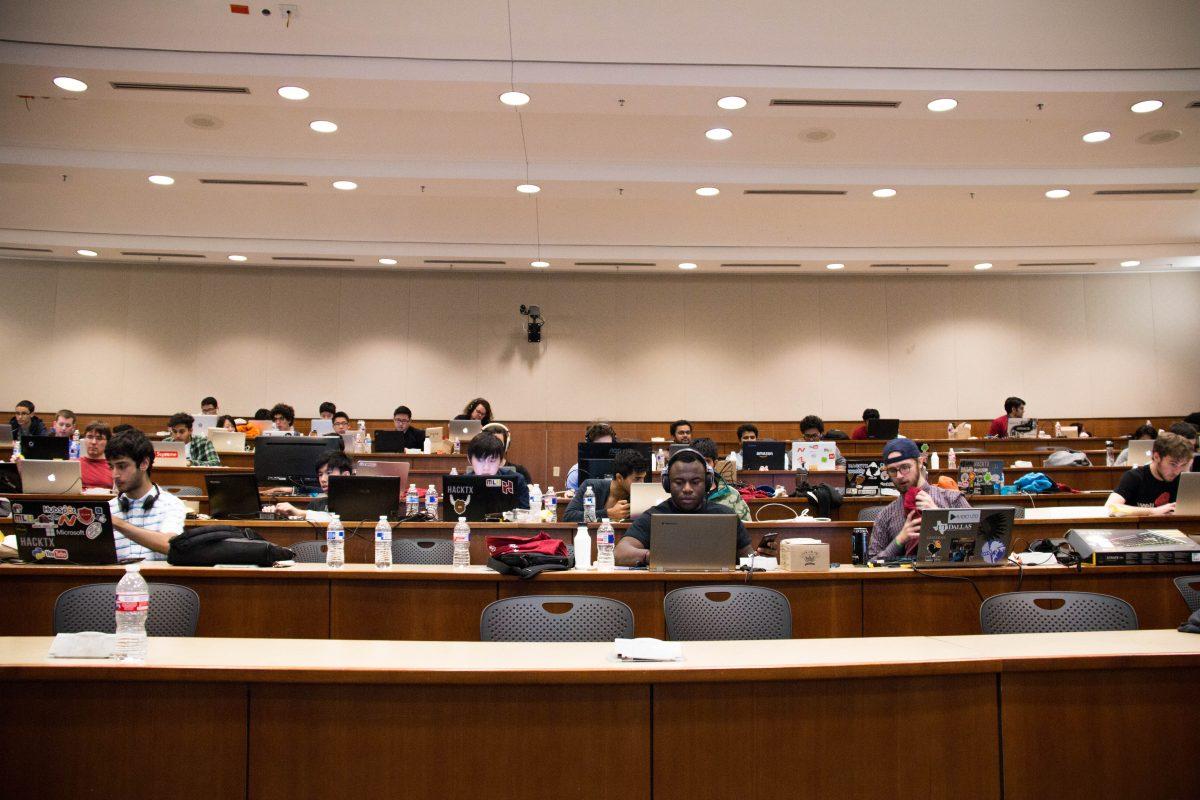Tech event that orgininated within university hosts students from across state, world in second-annual coding contest
A 1-year-old tradition on campus is quickly becoming a staple of the UTD community thanks to the dedication of students and professionals from across North Texas.
More than 400 hackers, sponsors and volunteers gathered in the ECS building on March 26 for HackUTD ’16, North Texas’ largest university hackathon and UTD’s Association for Computing Machinery’s annual flagship event.
Hackathons, which are weekend-long events in which college students gather in teams to work on software and hardware projects from scratch, have exploded in popularity in recent years. According to Major League Hacking, an international network of university hackathons, more than 400 hackathons are hosted on North American college campuses every year.
HackUTD was established last year by UTD’s ACM chapter after its members noticed that UTD lagged behind peer institutions, such as the University of Texas at Austin and the University of Houston, that have been hosting hackathons for some time.
“They’re something that nearly every university with a computer science program offers,” said Izuchukwu Elechi, a software engineering senior and President of ACM. “We wanted to start HackUTD because we saw a vacuum in North Texas.”s
The first HackUTD had 150 attendees and was restricted to UTD students due to limited resources. After a successful run, ACM decided to expand the scope of HackUTD 2016.
“Our vision this year was to get more sponsorships and include non-UTD students,” said biology senior and Director of HackUTD ’16 Zakariya Ahmed.
Part of the expansion included instituting an application process. At first, ACM only expected applications from Texas and neighboring states, but ended up with submissions from University College London to the University of California, Berkeley. Of the nearly 1,000 applicants, 600 RSVP’d and 360 attended the event. Because the hackathon took place on Easter Sunday, turnout was slightly lower than expected.
In addition to expanding geographical reach, HackUTD ’16 marketed itself to experienced hackers as well as novices to challenge the notion of hackathons as “expert only” events.
“There’s a pretty common misconception about hackathons,” said software engineering junior and Vice President of ACM Tahir Aziz. “Anyone is welcome to come, there’s no minimum experience or technical background required. … You can just come in and learn stuff on the fly.”
Another major component of HackUTD ’16 was the sponsor and industry mentor interaction. In between hacking sessions, students were free to network with company representatives and get help on projects from mentors.
“It’s a sort of a reverse career fair because it’s very casual,” Aziz said. “Students get to hang out with sponsors and learn about internships and jobs.”
In addition, some sponsors gave “tech talks” — informative presentations about specific developer tools and software — to provide insight into the role of technology in their organizations. For example, State Farm, the primary sponsor of the event, discussed the role of its mobile app in its business of helping people save money on car insurance. Other major sponsors included Google, Verizon, Fidelity, Wolters Kluwer and the NSA.
HackUTD organized various events throughout the night, including video game tournaments, raffle drawings and an Easter egg hunt. Many hackers stayed awake to finish their projects. At 12 p.m. on March 27, the judging panel received 31 completed projects, ranging from sushi-making games to internet-controlled robots, and evaluated them for technical difficulty, uniqueness and utility outside of the hackathon.
“Students can see what they’re capable of in such a short amount of time,” Elechi said. “A lot of students were introduced to the hackathon community for this first time and they’ll be able to apply these skills at other hackathons.”
Given the success of this year’s event, ACM has already begun planning for HackUTD 2017. Ahmed said he hopes to host the event in the soon-to-be-completed SSB extension in anticipation of higher attendance. Beyond expansion in size, Elechi noted that HackUTD ’17 will be aimed at students of all career paths.
“We’re planning for a more interdisciplinary focus by not just looking at computer science, but looking at computer science combined with areas such as art or music,” he said. “We’re bringing this … experience and getting it out there so everyone, regardless of field, can have a part in it.”





